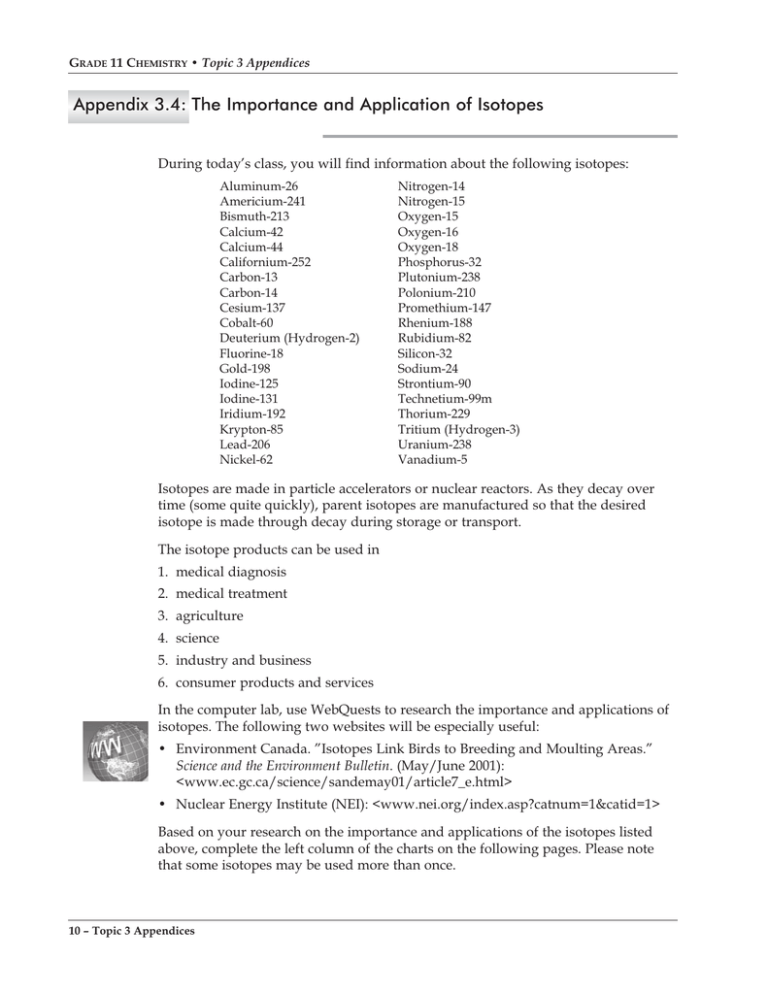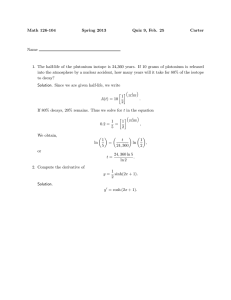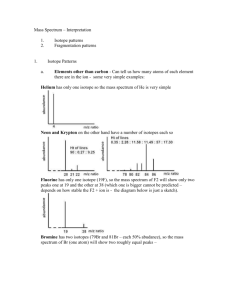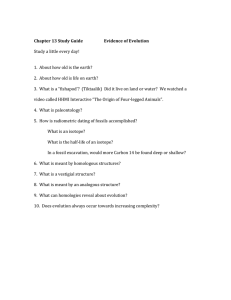Appendix 3.4: The Importance and Application of Isotopes
advertisement

GRADE 11 CHEMISTRY • Topic 3 Appendices Appendix 3.4: The Importance and Application of Isotopes During today’s class, you will find information about the following isotopes: Aluminum-26 Americium-241 Bismuth-213 Calcium-42 Calcium-44 Californium-252 Carbon-13 Carbon-14 Cesium-137 Cobalt-60 Deuterium (Hydrogen-2) Fluorine-18 Gold-198 Iodine-125 Iodine-131 Iridium-192 Krypton-85 Lead-206 Nickel-62 Nitrogen-14 Nitrogen-15 Oxygen-15 Oxygen-16 Oxygen-18 Phosphorus-32 Plutonium-238 Polonium-210 Promethium-147 Rhenium-188 Rubidium-82 Silicon-32 Sodium-24 Strontium-90 Technetium-99m Thorium-229 Tritium (Hydrogen-3) Uranium-238 Vanadium-5 Isotopes are made in particle accelerators or nuclear reactors. As they decay over time (some quite quickly), parent isotopes are manufactured so that the desired isotope is made through decay during storage or transport. The isotope products can be used in 1. medical diagnosis 2. medical treatment 3. agriculture 4. science 5. industry and business 6. consumer products and services In the computer lab, use WebQuests to research the importance and applications of isotopes. The following two websites will be especially useful: • Environment Canada. ”Isotopes Link Birds to Breeding and Moulting Areas.” Science and the Environment Bulletin. (May/June 2001): <www.ec.gc.ca/science/sandemay01/article7_e.html> • Nuclear Energy Institute (NEI): <www.nei.org/index.asp?catnum=1&catid=1> Based on your research on the importance and applications of the isotopes listed above, complete the left column of the charts on the following pages. Please note that some isotopes may be used more than once. 10 – Topic 3 Appendices GRADE 11 CHEMISTRY • Topic 3 Appendices Appendix 3.4: The Importance and Application of Isotopes (continued) 1. Medical Diagnosis Isotopes can identify abnormal bodily processes, because some natural elements tend to concentrate in certain internal organs. After a patient has been injected with an isotope, a special camera can take pictures of the internal workings of the patient’s body. Nuclear medicine was developed in the 1950s. Isotope Use • • PET (positron emission tomography) scans use these two isotopes to measure energy metabolism in the brain. • This isotope is used to image the thyroid, heart, lungs, and liver. It also measures blood iodine levels. • Injected into the bloodstream as a salt solution, this isotope can be monitored to trace blood flow in order to detect constrictions and obstructions in the circulatory system (i.e. prevent a heart attack). • This isotope is used in cardiac (heart) imaging because its chemical reactivity is similar to that of potassium (which is used in muscles, such as the heart). Once the isotope reaches the heart, a PET image can be made. The isotope decays away within a day. • This isotope helps diagnose bone infection in children, as well as brain tumours. • This isotope is used to detect helicobacter pylori (which can damage the stomach lining and lead to ulcer formation) in the human stomach. If the bacteria are there, they will ingest the isotope and produce 13CO2 that will be exhaled at a higher concentration than normal. Topic 3 Appendices – 11 GRADE 11 CHEMISTRY • Topic 3 Appendices Appendix 3.4: The Importance and Application of Isotopes (continued) 2. Medical Treatment The direct internal or external application of isotopes is superior to chemotherapy because the isotopes are specific to the tumour or cancer involved, and cause less damage to healthy tissue. Isotope Use • This isotope fights lung cancer and leukemia. • Implants of this isotope, or mixtures of Strontium-90 and Ytterbium-90, are used to destroy pituitary and breast cancer tumours. • Gamma rays from this isotope are used to destroy brain tumours. • This isotope is used as a therapeutic seed implant for prostate cancer. • Used to treat Graves’ disease (a thyroid condition), this isotope concentrates in the thyroid and destroys the diseased portion. It is also used to treat thyroid cancer. • This isotope treats cervical cancer. • This isotope treats bone pain. 3. Agriculture Isotope • • • Use These three isotopes help farmers determine the amount of nutrients and water that plants take from the soil. This information gives farmers a better indication of how much fertilizer and water they should use to avoid excess. It helps them to protect the environment from runoff, to preserve the water supply, and to save money. Other Uses of Isotopes in Agriculture • To breed disease-resistant livestock, scientists use radioactive material to pinpoint where illnesses strike animals. • Scientists use isotopes to control pests. Small levels of radiation sterilize disease-laden insects and pests, replacing the undesirable use of pesticides. • Isotopes are used to develop new strains of virus-resistant plants. 12 – Topic 3 Appendices GRADE 11 CHEMISTRY • Topic 3 Appendices Appendix 3.4: The Importance and Application of Isotopes (continued) 4. Science Isotope Use • This isotope links birds and butterflies to their breeding and moulting areas. It enters feather and wing tissue (where the feathers are grown or the wing tissue is developed) as a result of the water that the organisms drink and the plants they eat. Concentrations of this isotope are higher in organisms from southeast regions of North America, and lower in the northwest regions. When water evaporates at the equator, the water with this isotope evaporates faster because it is heavier. • An isotope of this element was used to find a possible explanation of why some mallard ducklings born and raised in agricultural areas cannot fly. • • Criminal investigators use the ratio of these two isotopes in hair, tissues, and fluids to determine where people have lived. • This isotope measures the silicon uptake by ocean phytoplankton in order to monitor possible trends in global warming. • • One of these isotopes is given intravenously to a patient, and the other is ingested. The isotope given intravenously passes quickly through the body, while the ingested one must be metabolized. The ratio between the two isotopes indicates how long calcium is retained in the body before it is eliminated. • • These two isotopes are used to date objects such as rocks. They can be used to date objects up to 4.5 x 109 years old. • This isotope is used to study the effects of acid rain. Its path to waterways can be modelled using the isotope as a tracer. It is also being used to see whether there is a relationship between aluminum and Alzheimer’s disease. • • The ratio between these two isotopes is used to indicate global temperatures. Rain near the tropical ocean has more of the heavier isotope, while precipitation near the poles has more of the lighter isotope. During ice ages, more of the lighter isotope is locked into polar ice, and rain everywhere on the planet has a higher concentration of the heavier isotope. • Large quantities of this isotope are required for nuclear weapons and nuclear reactions. It is also burned in brown dwarfs (failed stars). Topic 3 Appendices – 13 GRADE 11 CHEMISTRY • Topic 3 Appendices Appendix 3.4: The Importance and Application of Isotopes (continued) 5. Industry and Business Isotope Use • This isotope tracks leakage in buried sections of pipe. • This isotope gauges the moisture content of the soil at road- and building-construction sites. • • These two isotopes determine the efficiency of filtration systems. • This isotope is used to identify when mixing is complete in molten liquids. This ensures maximum strength for alloys. • • • These three isotopes are used to recognize welding defects in pipelines, boilers, and aircraft parts. The radiation is passed through the object, striking photographic film on the other side. The greater the number of cracks, breaks, or flaws in the object, the more radiation is recorded on the film. • This isotope is used in industrial devices to eliminate static electricity. It is also used to treat bottles before they are filled and to reduce static charge in the production of photographic film. • Museums rely on this radioactive material to verify the authenticity of paintings and art objects, while archeologists use it to determine the age of bones. • • These two isotopes can be used to detect explosives. • This isotope provides National Aeronautics and Space Administration (NASA) spacecraft with power. • This isotope is a fuel for nuclear power plants. • This isotope monitors paper thickness. If too few particles of this isotope pass through to the detector, the paper is too thick. If too many particles pass through, the paper is too thin. (continued) 14 – Topic 3 Appendices GRADE 11 CHEMISTRY • Topic 3 Appendices Appendix 3.4: The Importance and Application of Isotopes (continued) 5. Industry and Business (continued) Isotope • • Use Food is exposed to either of these two isotopes for 15 to 45 minutes in order to kill bacteria and parasites that can cause disease. (Note: This does not make the food radioactive.) This exposure reduces spoilage and increases the shelf life of foods in areas without refrigeration. While the process reduces levels of vitamin A, vitamin C, vitamin E, and thiamine, the levels are not reduced as much as when foods are cooked, canned, or frozen. The same isotopes are used to sterilize cosmetics, hair products, medical devices, bandages, condoms, tampons, and contactlens solutions. • This isotope is used to date vintage wines. Other Uses of Isotopes in Industry and Business • Some isotopes can determine the flow rates of piping systems. • The automobile industry uses isotopes to measure the rate of engine wear and the quality of steel used to make cars. • Manufacturers use isotopes to monitor the corrosion of their processing equipment. • Isotopes are used to identify the densities of various materials. • The proper thickness of aluminum and tin cans can be maintained with the help of isotopes. • Some isotopes are used to identify the geological structure of a site. This would show the likelihood of finding oil, natural gas, or minerals. • Isotopes used in photocopiers help eliminate static and prevent papers from sticking together. Topic 3 Appendices – 15





